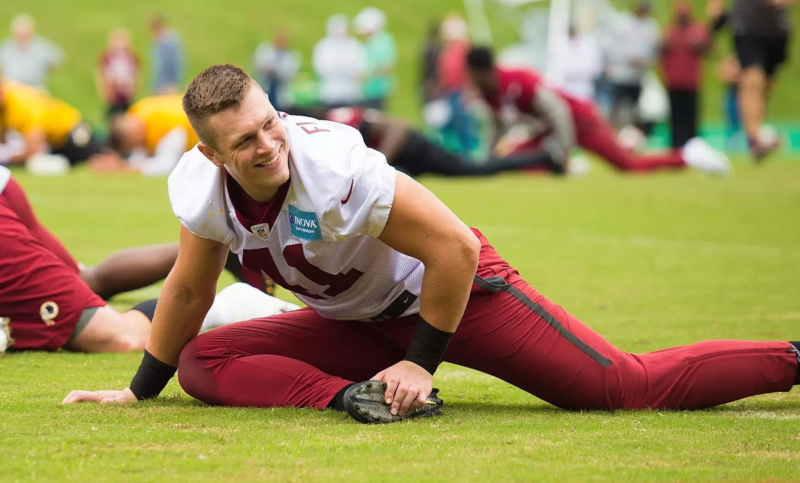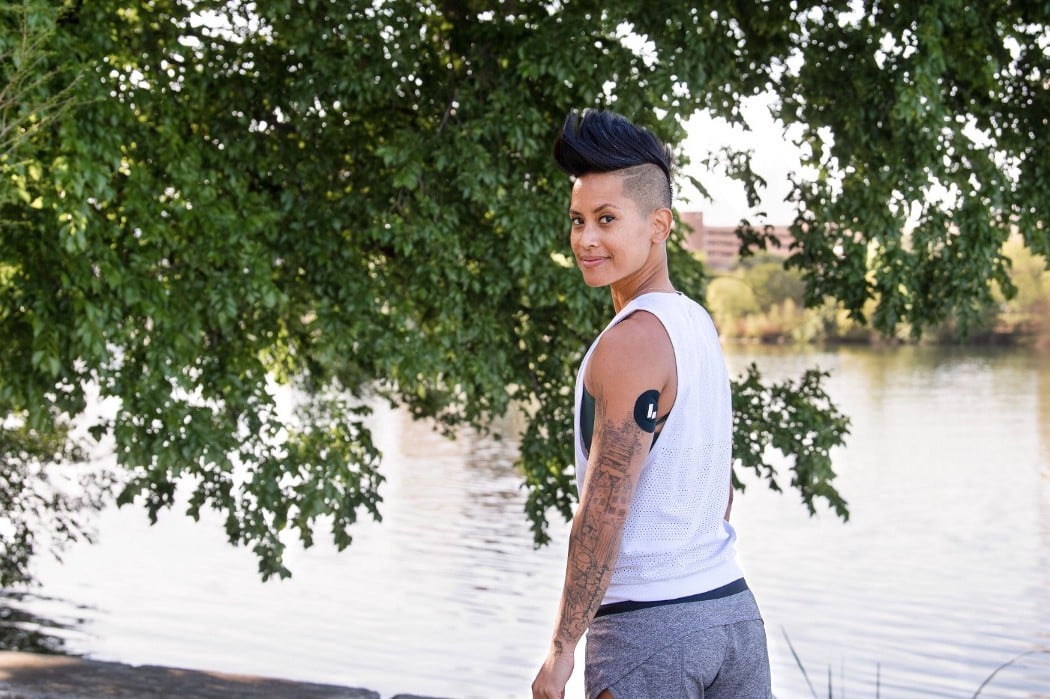How do you move up in your career when it seems like everyone believes they already have you figured out?
That’s a question Levels Support Specialist Matt Flanagan has been challenged with since he was a high school athlete in New Jersey. While working his way up to the highest levels of football competition — first in the NCAA and then in the NFL — he has confronted the question again and again.
Throughout all this, he’s figured out a few principles for elevating one’s game — whether business or athletic — to the next step, and proving doubters wrong along the way.
1. Make bets on yourself.
Flanagan started playing football when he was in high school, so he missed the track New Jersey’s most serious young football players take: proving themselves on the gridiron for elite private schools with top-tier programs.
“New Jersey football is mostly dominated by the slew of private schools in Northern New Jersey who have the ability to recruit and dominate their public league opponents year in and year out,” Flanagan explained.
This is a major factor in college football recruiting in the Garden State.
“With a finite amount of time able to spend on the road, college coaches were almost forced to focus their efforts recruiting out of those schools instead of mine,” he said.
Even when Flanagan performed well at recruiting camps, scholarship offers were elusive.
“I didn’t fit the profile of a player who’s deserving of a scholarship,” he said.
Flanagan called the experience “extremely frustrating,” but noted that being an “outsider” of sorts since the beginning of his football career has done much to shape his path.
Rather than abandoning his college football dream, Flanagan made a solid bet on himself when he decided to attend Rutgers University and walk on to the football team. He would vie for a spot on the team despite not being offered a scholarship.
College coaches don’t have to accept a walk-on player, but the Scarlet Knights coaching staff liked what they saw and brought Flanagan on board. Eventually, they gave him a scholarship.
He spent four years as a tight end at Rutgers (including one “redshirt” year, in which he didn’t play and his eligibility status with the NCAA was preserved), then transferred his final year of eligibility to the University of Pittsburgh as a graduate student.

None of this would have happened if Flanagan let rejection rob him of the courage to bet on himself succeeding as a walk-on, and to continue pursuing the scholarship and college playing experience he wanted.
In business as in sports, people and companies must make smart bets on themselves to move to the next level. Usually, that involves vulnerability and movement into an arena in which success is not guaranteed. The only way to know if a bet is worth making is to be informed.
To do this, one must “constantly collect information and experiment,” Flanagan noted. “Being able to move with confidence and make smart bets is a result of understanding the landscape in which you’re operating.”
2. If you don’t fit the mold, break it.
As Flanagan was finishing college, he again found himself on the outside looking in. He wasn’t one of about 330 athletes invited to participate in the NFL Scouting Combine — a week-long yearly event in which invitees submit to a variety of tests and have their measurements and speed tracked. Coaches, scouts and other team personnel attend to size up the new crop of talent coming out of college.
Here, the metrics are more personalized than, “Where did you go to school?” but are they more accurate? Is a player’s talent rooted solely in statistics such as how fast he runs, the length of his arms and the span of his hands?
“I never thought my upside was properly underwritten by these recruiting systems,” Flanagan added. “I wasn’t a highly touted high school or college player. I wasn’t offered a scholarship to play at a big school or picked on draft day.
“Others in my shoes have gone the other way after being told no time and time again. Even when the cards were stacked against me, I never let it break my spirit or change the way I carried myself.”
But there was at least one team that saw his upside, even if they didn’t use a draft pick on him. After going unselected in the 2018 NFL draft, Flanagan signed with the Washington Redskins as an undrafted free agent and later made their team as a member of the practice squad.
“I’ve always been willing to bootstrap my way to a scholarship or a spot on an NFL roster if that’s what it was [going] to take to prove them wrong,” he said.
But how does one “bootstrap” it to the next level of sports or business competition?
For Flanagan, this entails shifting focus from the flawed metrics others are using to competition “between the lines.”
“There is a space in between the lines, in between the whistles, where it’s just you and your opponent,” he said. “It doesn’t matter how many stars he has on his profile or what offers he’s gotten.… those [were] moments of validation where you get to just go out there and compete.”
Flanagan knew he could compete between the lines, and he convinced the Washington Redskins of it, too.
The business equivalent is when a founder, employee or company rapidly iterates to find what they do best and uses that information to position their resources around product-led growth.
Competitors might be able to outraise and outspend you, but you can not purchase product-market fit.

3. Study your successes, not your failures.
Once on the Redskins practice squad, Flanagan set his sights on one of the 53 spots on the team’s active roster.
He knew constant improvement was the key to securing one. He was fortunate as a tight end to observe and emulate one of the greatest tight ends in NFL history: Vernon Davis. “It was not just his athletic gifts that made him special, but his attitude about practicing consistency,” Flanagan said.
The two worked on catches together after every practice.
“‘Sweat, the small stuff,’ he’d say,” Flanagan recalled. “‘This way, you’re always prepared when the ball comes your way.’ Things like tucking the ball after every catch to practice ball security were the little things that have always been important, and the repetition helped me perfect my craft.”
When Flanagan was promoted to the active roster and saw some game time, intentional habits while studying opponents on film were just as important as honing fundamentals.
“When we did come across a really great play, we’d watch it over and over again, breaking down everything from assignment to where feet and hand positioning were,” he said. “ … we chose to invest our time learning how to do things the right way, instead of focusing [on] how to not do them wrong. I’m a firm believer that learning flourishes off what we do well and not what we do poorly.”
To apply this to business, recognize and celebrate when things go well. Become a student of your victories, and the victories of others.
When we replay and study these wins, we can thoughtfully focus our efforts on making good outcomes repeatable and figure out how to apply these principles to future opportunities.
4. Invest in yourself for the future.
Flanagan knew his football career wouldn’t last forever and that he needed to prepare for the next chapter of his life.
“NFL stands for ‘not for long,’” he noted. “And that’s one of the first things that they’ll tell you when you get there. It’s the only sport with a one-hundred percent injury rate.”
He took the same approach of continuous improvement off-the-field by using the NFL Player’s Association tuition reimbursement benefit to pursue an MBA and participate in off-season career development programs while playing. During an externship for WeWork, which offers shared workspaces to companies and entrepreneurs, Flanagan got a taste of the challenges startup founders wrestle with and was introduced to Stew Bradley, a former NFL player, and future employer.
A little more than two years after the Redskins signed him, Flanagan’s NFL career ended after an injury and a brief stint with the Jacksonville Jaguars. But thanks to the investments he’d made in his future, he transitioned smoothly into working for Stew at El Cap Holdings, a venture capital fund investing in early-stage startups. He moved from El Cap to Levels in November 2021 and says he feels right at home as part of the operations team.
“I remember saying ‘Levels would be a home run, I’d love to work here’,” he recalled. “It marries all of the things I’m interested in. From the actual science and metabolic health side of it …to working with people who ship fast, and do it in public. It’s incredibly exciting to bring something new into the world. ”
You might not need to prepare for a career change, but investing in yourself by diversifying your skills is never a bad idea. It might open doors you didn’t anticipate.









